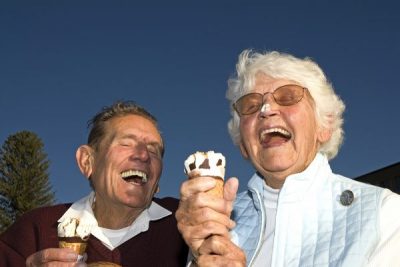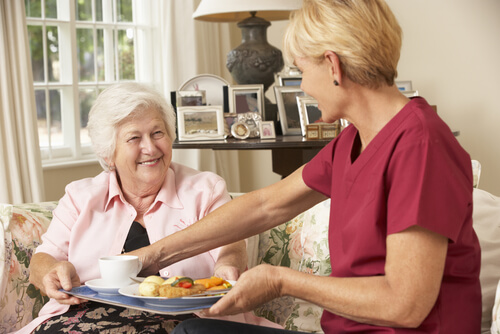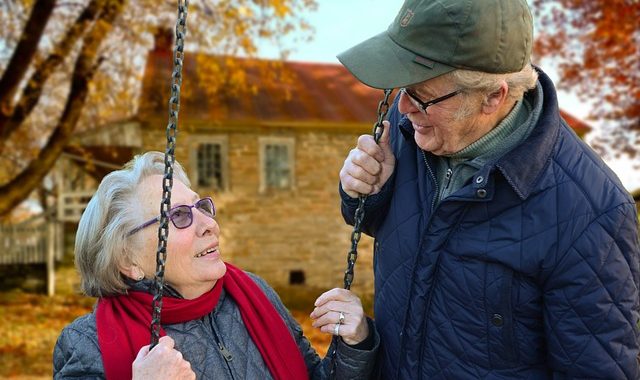
Are the Elderly Happier Than the Young?
New Evidence Shows The Elderly to Be Happier
The internet was abuzz last week with the news of a recent study that suggested the elderly may be happier than younger people. The Journal of Clinical Psychology surveyed 1,500 San Diego residents aged 21 to 99. The study authors’ concluded people in their 20s appeared to be far more stressed and dissatisfied with themselves compared to those in their 90s.
The researchers also found that these results did not change over time, but steadily remained true throughout life. Their findings seemed to strongly suggest a correlation between age and mental health. They further suggested that young people were more affected by stress and anxiety than older people. When asked, those in their 20s and 30s reported higher levels of stress and anxiety. Possible reasons proposed by the study’s authors for why the elderly responded more positively to the survey include: an increased focus on relationships and meaningful activities, an appreciation for the simpler things in life, and a mental fortitude forged in experience. In short, the findings suggest the older the participants were, the happier they were.
It’s an interesting idea. Can the elderly actually be happier and more satisfied with life than the young? The thought may leave some of us scratching our heads. In our culture, there seems to be an underlying drive to stay younger. We want to avoid aging. All manner of products are advertised to us making the promise that they hold the secret to looking and feeling younger. But why are we trying to stay young? Does our age really affect our overall happiness? What is so bad about aging, anyway?
The Scoop
A quick internet search will turn up a myriad of articles about aging, but when the question, “does aging make me happier?” is asked, the results are fascinating. A recent study by the University of Chicago turned up an interesting finding. Overall, about 33% of seniors surveyed said that they were very happy at age 88, as opposed to only 24% of people aged 18 to 24. The poll also suggests a correlative increase in happiness with an increase in age. The study authors found a 5% increased probability that a person would respond as happy for every 10 additional years of age.
Young and Old
The perspective that aging makes you unhappy is primarily youth-centric. Youth often see their elders in terms of the challenges that they face with health, mobility, and loss. It wouldn’t be hard to imagine why they, the young, would assume that the elderly should be unhappy. What they do not see is the profoundness that age affords. Another study mentioned in the New York Times has suggested that the types of experiences that make us happy change over time. Seniors have more confidence and wisdom than the young, pride in their family, satisfaction with triumphs in life, slowing down and enjoying life, and escaping the pressures of business. Seniors have an appreciation for the little things. Perspective means a whole lot more than we think. Emotional wellbeing is critical. As we age we have better control of our emotions, we understand stress points in our lives and learn to cope with them better.
Better with Age
As we age, the threat of our inevitable demise looms closer. This may be the driving force behind how we re-prioritize with age. We look at life less in terms of expansion and exploring and more in terms of relationships, family, and cultivation. We understand that our time is limited and place emphasis on the present. The focus on emotionally meaningful goals contributes to our emotional health, which in turn benefits our lasting physical health overall. As a result, our quality of life improves. We are happier as we age, naturally. Another thing to note is that seniors engaged in more social activities on a regular basis further optimize their health.
A Community of Well-Being
A study from the University of Chicago discovered that about 75% of people aged 57 to 85 participate in one or more social activities at least every week. These social activities could be defined as talking with their neighbors, going to church, volunteering, or being a member of a special interest group. Why is this important? Studies suggest that time spent in regular social activities affect emotional and physical health. This is seen as a big factor in elderly health. Elderly people who are using in home supportive services are more likely to benefit from a better social life than those who do not. Caregivers are not just personal assistants, but can be close friends with those for whom they care. New memories and experiences can be made with a caregiver companion. With additional support from family members, in home supportive services can be a truly great thing.
The Key to Happiness is Other People
Imagine someone who may have difficulties with getting out of the house and has no-one to keep them company or help them at home. They can get the help they need without the stress of moving to a retirement home. Home health agencies provide the services a senior may need, all in the comfort of their own home. They wouldn’t be alone, they would have someone to talk to, share time with. They would also be able to have more freedom of mobility in doing things outside their home. Would this contribute to happy aging? You bet.
Happier?
The data may sound promising, however a few surveys cannot speak for everyone. There are many factors that go into living a happy life. One thing to consider is that young or old, people need a social group; whether that be family or friends, or even in home supportive services. The important thing to remember is we are not meant to be alone. Reach out to someone you care about and spend some much needed time with them! The odds are you will be much happier with loved ones than without.
Article written by Caleb Schniepp.






